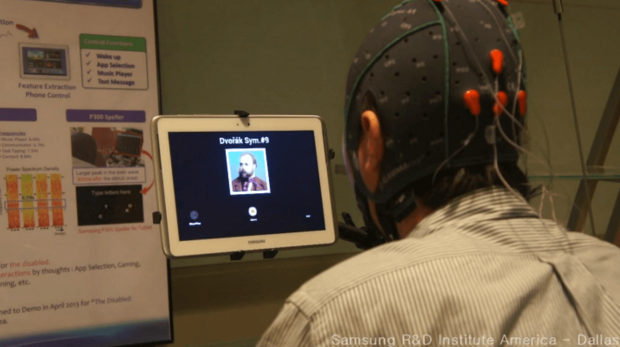Here’s a fascinating one for you dotTechies. Samsung is exploring the idea of producing technology that interacts with brainwaves. They’re hoping they can build a tool that lets you use your mind to control a tablet or smartphone. It sounds crazy, right?
Samsung is actually working with researchers from the University of Texas to explore unique EEG (Electroencephalography) caps. These caps essentially measure electrical activity from your brain and convert it to usable data. In the case of this project, the EEG caps will allow users to control tablet and smartphones with their mind.
Realistically, the system is nowhere near perfect at the moment. It’s actually tailored more for folks with disabilities and is designed to give them some sort of control over various devices. Hopefully, the system will eventually be perfected to the point where it’s not so awkward. Many of the EEG caps are littered with wires and sensors, making them a little too ugly to wear in public.
Currently the system works like this, users wear a pretty bulky EEG cap on their head which measures electrical activity along their scalp. In its current state, users can make selections on screen by focusing on a single icon that flashes at different intervals from others. The system reads the appropriate action and uses the information to identify a precise electrical pattern.
Researchers estimate that the system is about 80 to 95 percent accurate, most of the time. In addition, participants are able to make a selection about every five seconds on average.
Their main focus for the project is to develop EEG hats or caps that can be worn throughout a regular day. Obviously, this means they need to be more comfortable and a lot less meddlesome. No one wants to walk around with a series of wires hanging down from their head. At least, I don’t think they do. Do you?
Anyway, Samsung is quite smitten with the idea of mind controlled devices so naturally their research team is working directly with Roozbeh Jafari, an assistant professor of electrical engineering from the University of Texas.
What do you think? Would a tablet or smartphone controlled entirely by your mind be a cool idea? All I can come up with is a ton of frustrating scenarios because technology has a way of doing that to you.
[via BGR, MIT Technology Review]

 Email article
Email article




